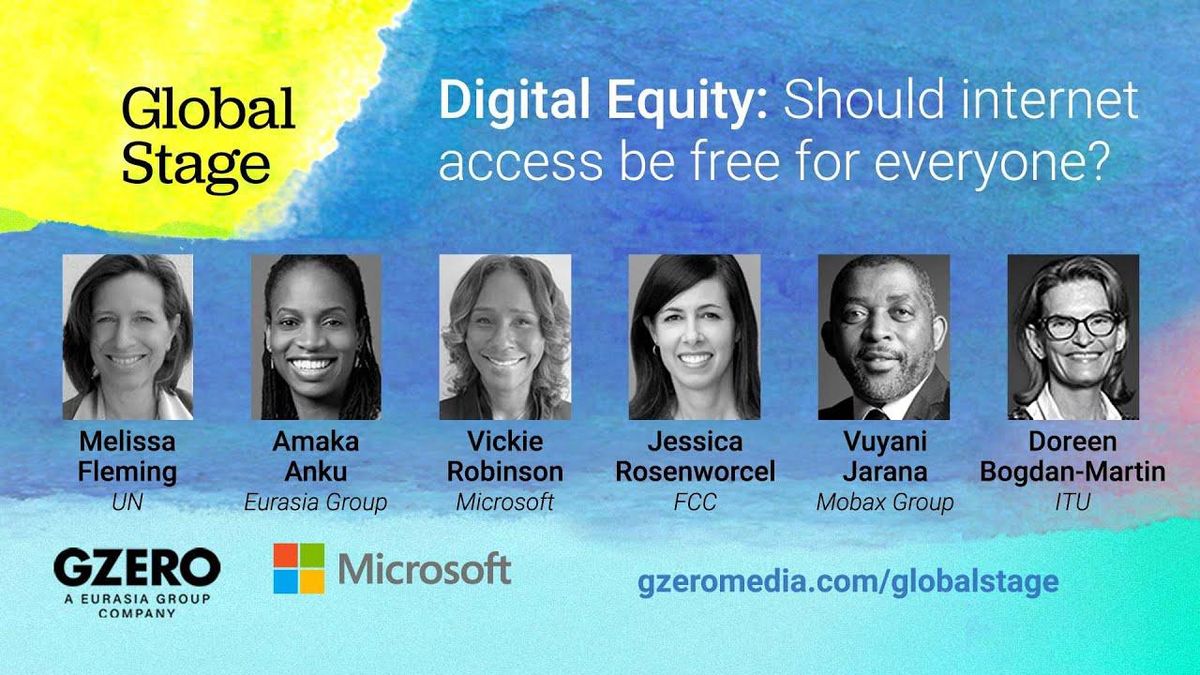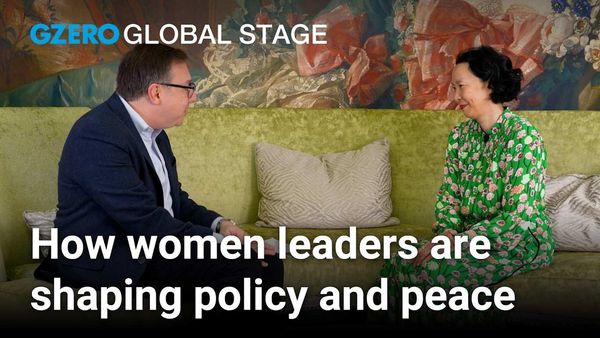Half of the world's population is currently offline, and COVID has further widened the digital gap. Providing more than three billion people with affordable, reliable internet access sounds like a no-brainer, but the devil is in the details. Who'll pay for it, how do we measure success, who should be on board, and what are the potential benefits?
Several experts weighed in during a Global Stage virtual conversation hosted by GZERO Media in partnership with Microsoft during the 76th UN General Assembly, moderated by the UN's Melissa Fleming.Don't miss our next event: LIVE on Wednesday Oct 13 11am ET/ 8 am PT:
Infodemic: Defending Democracy Against Disinformation
Vickie Robinson, head of Microsoft's Airband Initiative to expand broadband access throughout the developing world, what's really important is for the internet to be accessible, not necessarily free. The problem, she explained, is that it costs money to build and maintain networks, so no costs for end users could have unintended consequences. Instead, Robinson would focus only on giving access to people who really need it and can't afford to be online.
Make Internet Affordable, but Not Free for All | Global Stage | GZERO Mediayoutu.be
Even developed countries have their own problems getting everyone online. Jessica Rosenworcel, acting chair of the US Federal Communications Commission, said that mapping the real state of America's broadband access is currently flawed because a single subscriber in a rural area doesn't mean everyone is online. Until the US comes up with a better way to show who actually has internet access and who doesn't, the problem will likely never be fixed.
We'll Never Fix America's Internet Without Measuring Access Properly, Says FCC Chair | Global Stageyoutu.be
Then there's another important question: whose responsibility should it be to bridge the "digital Grand Canyon" of exclusion, asthe UN refers to the digital divide? For the International Communications Union's Doreen Bogdan-Martin, the only way is to get all concerned parties — the UN, governments, international institutions, the private sector, and civil society — to work together.
How can we bridge the "digital Grand Canyon"? | Global Stage | GZERO Mediayoutu.be
If everyone who needs access to the internet gets it, the world's least-connected continent — Africa — could benefit tremendously. Eurasia Group's top Africa analyst Amaka Anku explained that getting all Africans online could spur economic growth by formalizing the informal sector, which is very large and hard to tax, as long as African governments help out by cutting red tape for investment.
Want Africa to Grow? Get People and Businesses Online: Africa Expert | Global Stage | GZERO Mediayoutu.be
Stay informed about further Global Stage discussions: sign up for updates and reminders about GZERO Media's events.
- Panel: Why access to broadband & digital skills is critical - GZERO ... ›
- Global Stage virtual events return this fall - GZERO Media ›
- Beyond SolarWinds: Securing Cyberspace - GZERO Media ›
- GDP should reflect cost of polluting planet, says Microsoft's John Frank - GZERO Media ›
- COP26 vibes so far: "What's it worth to save everything we have?" - GZERO Media ›
- Global Stage virtual events return this fall - GZERO Media ›
- Join us April 21 for our next Global Stage event live from Washington DC - GZERO Media ›
- Want global equality? Get more people online - GZERO Media ›
- Join us April 21 for our next Global Stage event live from Washington DC - GZERO Media ›
- How to get students back on track after the Great Education Disruption - GZERO Media ›
- Join us for our Global Stage event live from Washington DC - GZERO Media ›
- Global Stage: Global issues at the intersection of technology, politics, and society - GZERO Media ›
- The fight to “connect every last person” to the internet - GZERO Media ›
- "Access is a fundamental right" - Digital activist Vilas Dhar - GZERO Media ›
- Accessibility is critical for the world's disability community - GZERO Media ›
- AI for Good depends on global cooperation, says ITU's Doreen Bogdan-Martin - GZERO Media ›


















